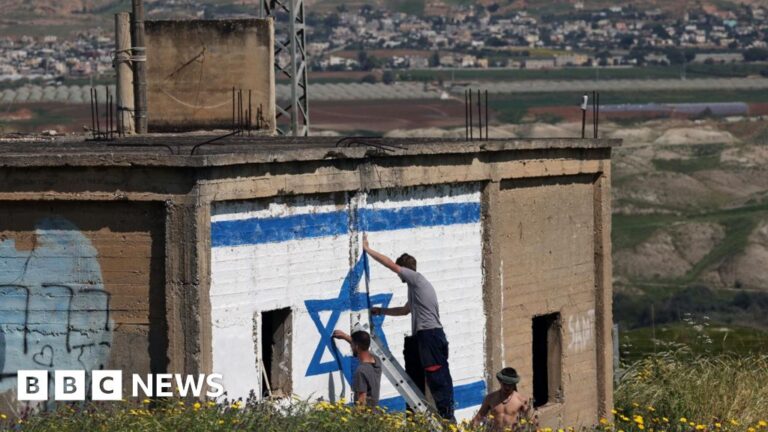- author, David Gritten
- role, BBC News
Palestinians and the United Nations have criticized what anti-settlement monitors say is Israel’s biggest land seizure in the occupied West Bank in more than three decades.
According to Peace Now, about 12.7 square kilometers (4.9 square miles) of the Jordan Valley was declared “national land” in June, denying Palestinians private ownership and use rights.
The group said the declaration also established “territorial continuity” between Israeli settlements in the main border corridor with Jordan.
Palestinian officials say the occupation is aimed at taking Palestinian land, while the United Nations has criticised it as a “step in the wrong direction” towards a two-state solution to the Israeli-Palestinian conflict.
The declaration was welcomed by Finance Minister Bezalel Smotrich, who has authority over settlement policy in the coalition government and is a far-right settler who considers the West Bank to be part of “Greater Israel.”
Since capturing the West Bank and east Jerusalem in the 1967 Middle East war, Israel has built about 160 settlements and is home to around 700,000 Jews in the areas that Palestinians want as part of their future state.
Most of the international community considers the settlements to violate international law, but Israel disputes this.
The seizures, approved by Israel’s Civil Administration last month but made public for the first time on Wednesday, mainly cover areas north of the Yafit settlement that have been designated a nature reserve or a “fire zone” by the Israeli military.
“The area declared is the largest since the Oslo Accords,” Peace Now said, referring to the 1993 interim peace agreements that provided for parts of the West Bank and Gaza to be administered by the Palestinian Authority until a permanent peace agreement was reached.
The group added that 2024 will “reach the peak in the extent of declared state lands,” with a total of 23.7 square kilometres having been seized so far this year, including eight square kilometres of land adjacent to the newest area linked to the Masua settlement.
Peace Now accused Smotrich and Prime Minister Benjamin Netanyahu of being “determined to fight against the interests of the entire world and the Israeli people for the benefit of a handful of settlers” over resolving Israel’s political crisis and ending the war in Gaza.
“Today, it is clear to everyone that this conflict cannot be resolved without a political solution that establishes a Palestinian state alongside Israel,” the statement said.
Asked for comment, UN spokesman Stephane Dujarric told reporters: “Frankly, this is a step in the wrong direction. The direction we want to go is to find a negotiated two-state solution.”
Meanwhile, according to the Wall Street Journal, Muayyad Shaaban, chairman of the Palestinian Authority’s Wall and Settlements Resistance Committee, said the occupation was “part of a larger plan to control the eastern West Bank”.
Israeli media reported that Smotrich welcomed the declaration, as well as news that the Israeli military’s High Planning Council would hold a two-day meeting to advance plans for building 5,300 new settler homes in the West Bank, and a decision last week by the Security Cabinet to retroactively approve five settlements that had been built without formal government approval.
“Thank goodness, we are building settlements, developing them and thwarting the danger of establishing a Palestinian state,” he was quoted as saying.
Peace Now released a recording of a speech Smotrich gave at a conference of his Religious Zionist party last month, in which the campaign group warned that the moves would irreversibly change how the West Bank is governed and lead to “de facto annexation”.
The proposals include completing the transfer of control of settlements from the military to civilian authorities, creating a “legalized bypass route” for settlement outposts, expanding authorization for agricultural outposts, and cracking down on unauthorized Palestinian construction, among other things.
In exchange for retroactive recognition of the five settlement sites, Smotrich reportedly agreed to unfreeze three months of tax revenues withheld from the Palestinian Authority and to extend an exemption protecting Israeli banks that do business with Palestinian banks.
The United States had urged Israel to release the funds, warning that further economic hardship for the Palestinians could lead to more violence in the West Bank.
The United Nations says more than 530 Palestinians and 14 Israelis have been killed in the region since the start of the war in Gaza, which was triggered by a deadly Hamas attack in southern Israel on Oct. 7.

